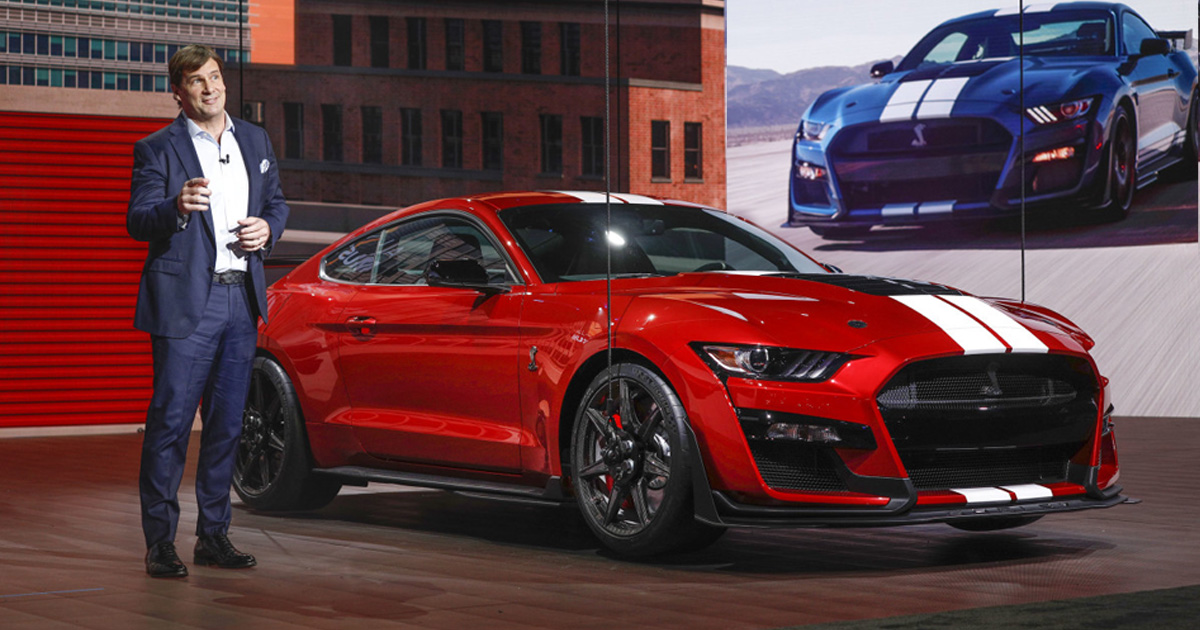New Era For Ford: No more boring cars, only icons

Ford CEO Jim Farley Declares War on “Boring Cars”—Focusing on Iconic Vehicles
In a move that’s sure to excite enthusiasts and shake up the automotive world, Ford CEO Jim Farley made a bold announcement: no more boring cars. During a recent interview with Car Magazine, Farley declared Ford’s commitment to getting out of the “boring-car business” and diving headfirst into the iconic-vehicle market. This shift signals a radical change in direction for Ford as they double down on vehicles that evoke passion, excitement, and, let’s be honest, pure adrenaline.

Gone are the days of the modest sedans like the Focus, Fiesta, Fusion, and Taurus. Instead, Ford is setting its sights on delivering vehicles that not only turn heads but also capture the spirit of driving enthusiasts around the world. From the rugged Bronco to the high-performance Mustang, and the off-road beast Raptor, Ford is making it clear—they’re all in when it comes to performance and presence. And if you ask any real car lover, that’s music to our ears.
A New Era of Iconic Vehicles
Farley didn’t mince words when he said, “We’re getting out of the boring-car business and into the iconic-vehicle business.” For years, vehicles like the Fiesta and Fusion have served a purpose—they provided dependable, affordable transportation. But for a brand that’s long been associated with muscle cars, off-road legends, and game-changing innovation, these “boring” models just don’t cut it anymore.
Ford is now pivoting toward what it does best: building vehicles that inspire. The Bronco’s revival, the Mustang’s continued dominance, and the Raptor’s off-road prowess are prime examples of the type of iconic vehicles that Ford wants to focus on. These are cars that people lust after, vehicles that make drivers feel alive every time they get behind the wheel. It’s not just about getting from point A to point B anymore—it’s about enjoying the ride and owning something that makes a statement.
Ditching Sedans for Performance and Power
The writing has been on the wall for a while. Ford’s decision to phase out vehicles like the Taurus, Fusion, and Fiesta wasn’t a snap decision. These cars, while reliable, were never truly profitable for the company. And in today’s competitive market, it’s all about return on investment. Farley openly admitted that vehicles like the Fusion were “loved by a lot of customers,” but they simply didn’t make financial sense anymore.
Instead, Ford will introduce a new wave of vehicles based on Volkswagen’s MEB platform, including future electric versions of the Explorer and Capri. These models will be electrified versions of classic Ford icons, reinforcing the company’s focus on cutting-edge technology while keeping the spirit of driving alive. It’s a delicate balance between innovation and tradition, but it’s a path that Ford seems eager to take.
The reality is that Ford, like many other automakers, is streamlining its lineup to focus on what truly matters to customers and enthusiasts alike: excitement, power, and presence. And who can argue with that?
No More Boring Cars Means More Enthusiast Options
For far too long, enthusiasts have felt neglected. Performance vehicles were seen as a side business, with the bulk of automakers’ attention focused on sedans and crossovers designed to appeal to the masses. But Ford is flipping the script, and as Farley said, “Now, these enthusiast vehicles are going to become our business.”
That’s right—performance cars like the Mustang are no longer just an afterthought; they’re going to be a core part of Ford’s future strategy. The Mustang Dark Horse with its 500-horsepower 5.0-liter V8 is just the beginning. And for those who crave even more power, the Mustang GTD, with a 5.2-liter supercharged V8 pumping out over 800 horsepower, is waiting in the wings. These cars aren’t just transportation—they’re experiences, and Ford knows that.
Ford’s Big Bet on High-End Vehicles
Ford is making no secret of its plans to move away from affordable sedans and focus on high-end, performance-driven vehicles. Farley sees Ford taking on brands like Porsche with its Mustang lineup, which he proudly boasts is the best-selling sports coupe in the world. With that kind of pedigree, it’s no surprise that Ford is aiming for the high-end sports car market.
Farley’s strategy is simple: rather than compete with the influx of cheap electric vehicles (EVs) coming from China, Ford is choosing to focus on what they do best—building high-performance, iconic vehicles that cater to enthusiasts. This move allows Ford to remain competitive while carving out a niche in the increasingly crowded EV market.
And it’s not just about high-end sports cars. Ford is investing heavily in off-road and SUV segments as well. The Bronco, for example, has been a massive hit with off-road enthusiasts, and the Raptor continues to dominate the truck world with its unbeatable combination of power, performance, and ruggedness. These are the vehicles that Ford sees as the future, and they’re betting big on them.
Electrification with a Twist
While Farley is clearly passionate about keeping internal combustion engines (ICE) alive, Ford isn’t ignoring the future of electric vehicles. The company has already announced plans to introduce several new electric models in the coming years. However, unlike other automakers that are rushing to go all-electric, Ford is taking a more balanced approach.
For example, the Mustang Mach-E has already proven that an electric vehicle (EV) can still have the heart and soul of a Mustang. But Ford isn’t just stopping with the Mach-E. The electric Explorer and Capri are set to join the lineup, proving that even as the industry shifts toward electrification, Ford’s commitment to building exciting, iconic vehicles won’t waver.
Ford’s Legacy of Performance Continues
Farley’s announcement is a reminder that Ford’s DNA is rooted in performance. From the earliest days of the Model T, Ford has always been about pushing the limits of what’s possible. And that legacy continues today with vehicles like the Mustang, Bronco, and Raptor.
By focusing on fewer models but investing more heavily in each one, Ford is ensuring that every vehicle they produce is a hit with enthusiasts. No more half-hearted attempts at performance—Ford is going all-in on building vehicles that are as fun to drive as they are to look at.
The End of the Affordable Car Era?
One of the more controversial aspects of Ford’s shift away from “boring cars” is the impact it will have on affordable transportation. The reality is that as Ford moves toward more expensive, high-performance vehicles, there will be fewer options for budget-conscious buyers.
However, there are still exceptions to this trend. The Ford Maverick, for example, remains one of the most affordable pickups on the market, and it has quickly become a favorite among truck enthusiasts. But make no mistake—Ford’s future lies in bigger, faster, and costlier vehicles.
What This Means for Enthusiasts
For enthusiasts, this is the best news possible. Ford’s decision to double down on iconic vehicles means that we can expect more performance, more power, and more excitement in the years to come. Cars like the Mustang Dark Horse and Bronco Raptor are just the beginning, and with Ford’s commitment to building enthusiast vehicles, the future looks bright for those of us who crave horsepower and adrenaline.
The Road Ahead
Ford’s shift toward iconic vehicles isn’t just about abandoning sedans—it’s about reimagining what the brand stands for. Farley’s vision is clear: Ford is no longer just a car company; it’s a performance brand that’s focused on delivering vehicles that people are passionate about. And for enthusiasts, that’s exactly what we’ve been waiting for.
With the rise of electrification, it will be interesting to see how Ford balances its love for internal combustion engines with the demands of a changing industry. But if one thing is clear, it’s that Ford isn’t backing down from its commitment to building exciting, powerful vehicles. And for car enthusiasts everywhere, that’s something worth celebrating. Photo Credit – Rebecca Cook /Reuters.

